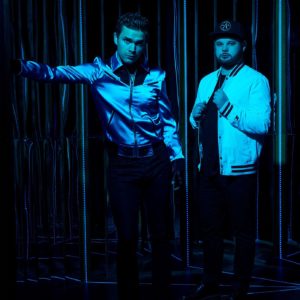Royal Blood experienced a kind of overnight success—even before releasing their first album—which has propelled them ever since, resulting in two #1 albums in the UK and a BRIT Award. Known for being a bass-and-drum two-piece, Royal Blood perfected their scuzzy, riff-driven rock sound and earned praise from high-profile fans like the Foo Fighters and Arctic Monkeys. Now, with the release of their third album, Typhoons, the duo have decided to switch up that star-making sound by incorporating a dance influence. They’re pulling from a greater range of styles—and having more fun, too.
Typhoons is an upbeat, high-energy collection of songs, mixing lightning-fast riffs with danceable beats—a glittery sidestep from Royal Blood or How Did We Get So Dark, but still lyrically holding on to the sense of anxiety and darkness that was much more overt on those first two records. Songs like “Who Needs Friends” and “Boilermaker” are more in the garage rock vein of earlier material, while other tracks like “Million and One” and “Oblivion” meld that sound with electro-funk, and “Limbo” struts further into dance territory. As a final surprise, the record closes with the piano ballad “All We Have Is Now.”
Even though this disco sound is splashed across the album, it’s paired with less celebratory themes. The first two singles, “Trouble’s Coming” and “Typhoons,” are built around key lines and riffs that repeat with a slight variation every time, emblematic of the band’s ability to make the most out of limited components. The lyrics themselves—“I hear trouble coming over and over again” and “Typhoons keep on raging and I don’t know why”—also concern themselves with repetition. That sense of spiraling permeates Typhoons, which is also how the record got its name. “I think repetition is the theme of the album,” vocalist and bassist Mike Kerr tells me. “It’s about repetitive destructive behavior, which is why those riffs circle around the way that they do.”
Over Zoom, Kerr explained how they found this new sound, flipped it on its head by combining it with darker lyrics, and how he’s often trying to out-dumb others.
The record sees you moving in a new direction—what was your reaction when you started hearing that sound? Did you just completely go for it, or was there any hesitation?
I think we’ve written so many songs that live in this world and this new vibe just felt so refreshing to us. It was like putting on a shiny jacket and it just fit perfectly. The minute we started making songs that you can move to like this, it was just impossible for us to stop. We were having so much fun—especially, for me, playing riffs. Usually you play a riff and it’s over this really heavy drumbeat and screaming vocals, so to have it so feminine, and so fun, and yet to have all the power of the band, it was just a very natural thing for us to do. I just felt very inspired by it. Sometimes writing songs can be like pulling teeth, and this album was not like that at all. It was actually very fun to be creative, and I hadn’t experienced songwriting like that in a long time.
What were your influences when it came to this record?
I think what you’re hearing on this album is influences from everything we’ve always loved [laughs]. We have a very broad range of music that we listen to, and I’m laughing because I’m thinking of our parties we throw ourselves on the tour bus once the show’s finished. And we’re listening to everything from Janet Jackson to the Bee Gees. It’s basically a party bus, and I guess all those songs we love, and that party atmosphere, we never saw belonging in our music. But the minute we included it, it just made complete sense.
“Sometimes writing songs can be like pulling teeth, and this album was not like that at all. It was actually very fun to be creative, and I hadn’t experienced songwriting like that in a long time.”
What was the process of making the album like, and how did lockdown play into that?
Lockdown had a huge effect on the record, and to be honest with you, only for the better. We were halfway through making a record and at the time—it was just so frustrating because it had taken so long for us to get to the position where we could make a record. But had that not happened, we wouldn’t have written “Typhoons,” “Limbo,” “Mad Visions,” or “Oblivion,” which is crazy to me, because they’re four of my favorite songs on the record. Lockdown only served us—it was just so pressure-free. In my mind, I had an album that was done, so anything new was just extra, but these new ideas were so good that they ended up just replacing songs that weren’t as good as them [laughs].
Are there any themes in the lyrics tying the album together? You’ve spoken a little bit about how the songs have a very positive, upbeat kind of feel, but the lyrics are a little darker.
Yeah, and that isn’t something that was premeditated. It was more something that was happening quite naturally. And I guess if I had thought about it too much, I might have not done it because it could have freaked me out as being a bit weird. But “Trouble’s Coming” for me did exactly that. The music was feel-good, and disco, but the lyrics were really dark, twisted, and actually made a really interesting combination. So once I knew it worked, I just carried on in that light.
You’ve also spoken about your sobriety. Can you talk a little more about how that impacted the album?
Its impact on the record was really down to my ability to trust myself. I think if you’re creative for a job, for a living, you have to be able to trust your instincts and trust what you think is good. And it was ultimate clarity. I really believed in what I was doing. I had so much to write about being sober, I had so much to say and talk about. The whole album is essentially about getting sober, to put it bluntly.
“Part of me thinks I’ve always wanted to make something like ‘Limbo,’ but either didn’t know how or didn’t feel I was allowed to. So I’m really glad that we did that.”
You also produced most of the album yourselves. How did you come to that decision?
It wasn’t really a decision. It just was happening already. “Typhoons,” for example: I made a demo, I got to the end of the demo, I played it to Ben, played it to the record label, and the demo sounded so good, we just kept it. So “Typhoons” is the demo, that’s what’s on the record. I think we just realized that we were already producing ourselves and we didn’t need anyone to come in and start pushing any buttons.
Are there any songs from this record that stand out to you as ones you’re particularly proud of?
“Limbo” to me, because I think it’s the furthest we’ve ever gone with our sound and our songwriting and it kind of breaks all the rules that we set upon ourselves in the beginning. It just feels like we’re kind of cut loose. Part of me thinks I’ve always wanted to make something like that, but either didn’t know how or didn’t feel I was allowed to. So I’m really glad that we did that.
I read in another interview you did that there’s this quote from Josh Homme that you’ve taken as advice, which is: “If you can’t outsmart them, out-dumb them.” Does that still influence the way you write?
It’s a mantra I live my life by. To be honest, it was something I was already doing, but when he said it, I was like, “Fuck, that’s what I’m doing” [laughs]. And I guess that’s why we get along so well. I’m in the business of out-dumbing people. And I’ve been doing it for years. And it’s so much fun. FL










